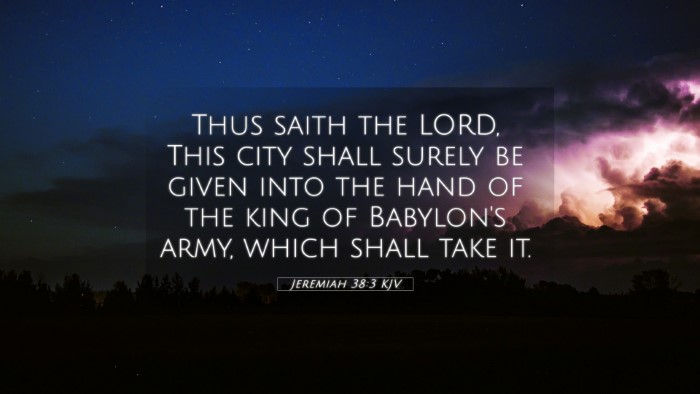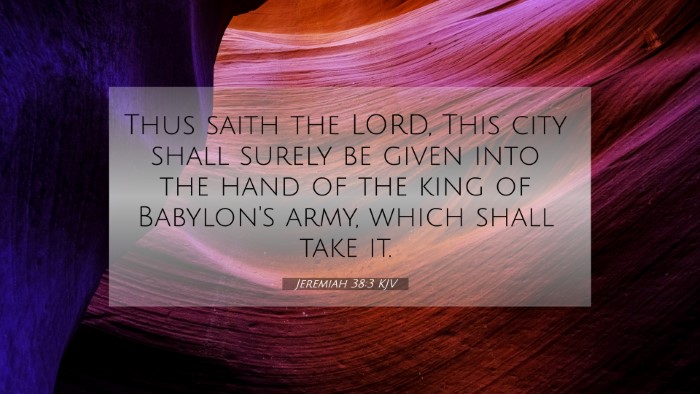Understanding Jeremiah 38:3
Jeremiah 38:3 states: "Thus says the Lord: This city shall be delivered into the hand of the king of Babylon's army, which shall take it." This verse serves as a prophetic declaration concerning the fate of Jerusalem during the time of Jeremiah. Below is a summary of its meaning combined from various public domain commentaries:
Context and Historical Background
To fully grasp Jeremiah 38:3, it is vital to understand the historical context of the siege of Jerusalem by the Babylonians. Jeremiah had been warning the people and their leaders about impending judgment due to their disobedience to God. His messages often led to hostility against him, yet he remained faithful in communicating God’s word.
Summary of Commentary Insights
-
Matthew Henry's Commentary:
Henry emphasizes the omniscience and faithfulness of God in delivering prophetic messages. He posits that Jeremiah's prophecy is not merely a statement of loss but a reflection on God’s overarching sovereignty and control over national affairs, emphasizing that the captivity was not for destruction but for eventual restoration.
-
Albert Barnes' Notes:
Barnes highlights the certainty of God’s judgment and the grave condition of Jerusalem. He notes that the prophecy indicates that the city’s fate is sealed and that the surrender is inevitable. This declaration is meant to align the people’s expectations with God’s divine plan, reinforcing the belief that God’s decisions are unchangeable.
-
Adam Clarke's Commentary:
Clarke remarks on the themes of divine justice and the people’s rebellion against God. He underscores that the prophecy serves as both a warning and a call for repentance, demonstrating that God, while just, also desires reconciliation and is sovereign even in judgment.
Key Themes and Lessons
The themes present in Jeremiah 38:3 include:
- Divine Sovereignty: God controls the fates of nations and cities; Jeremiah serves as a mouthpiece for God's will.
- Prophecy Fulfilled: The prediction showcases God’s ability to foretell events, illustrating His power over historical circumstances.
- The Consequence of Sin: The fate of Jerusalem reflects the outcomes of disobedience and rejection of God’s commandments.
- Call to Repentance: In the face of judgment, there remains a call urging the people to turn back to God.
Related Bible Cross-References
This verse relates to several key biblical texts that deepen our understanding of its message:
- Jeremiah 32:3-5: A prior prediction of Jerusalem’s fall.
- Jeremiah 1:15: God's appointment of nations to rise and fall.
- Ezekiel 12:12: A similar prophecy about the fate of Jerusalem.
- Lamentations 1:8-9: A mourning over the destruction of Jerusalem.
- Daniel 1:1: The beginning of the Babylonian captivity.
- Isaiah 39:6-7: A prophecy about the Babylonian invasion.
- Matthew 24:2: Jesus’ prediction of the destruction of the temple, linked to the consequences of sin.
- Luke 19:44: A reflection on Jerusalem’s future destruction due to rejection of Christ.
- Romans 11:22: The concept of God's kindness and severity, relevant to understanding judgment.
- Hebrews 12:25: A reminder not to refuse Him who speaks, correlating with the rejection in Jerusalem.
Conclusion
Jeremiah 38:3 serves as a profound reminder of God’s sovereign control and the seriousness of sin. The connections between this verse and others throughout Scripture illuminate the consistent themes of divine judgment, mercy, and the call to turn back to God. For those interested in understanding the deeper meanings behind this and related verses, exploring cross-referencing tools and thematic analyses can greatly enhance biblical study.
Tools for Bible Cross-Referencing
For individuals seeking to delve deeper into scriptural connections, consider utilizing:
- Bible concordance
- Bible cross-reference guides
- Cross-reference Bible study methods
- Comprehensive Bible cross-reference materials
Final Thoughts
Understanding verses like Jeremiah 38:3 requires an ongoing pursuit of knowledge through careful study and reflection. By engaging with cross-references and thematic connections, one can uncover the rich narrative threads that weave throughout the biblical text.




